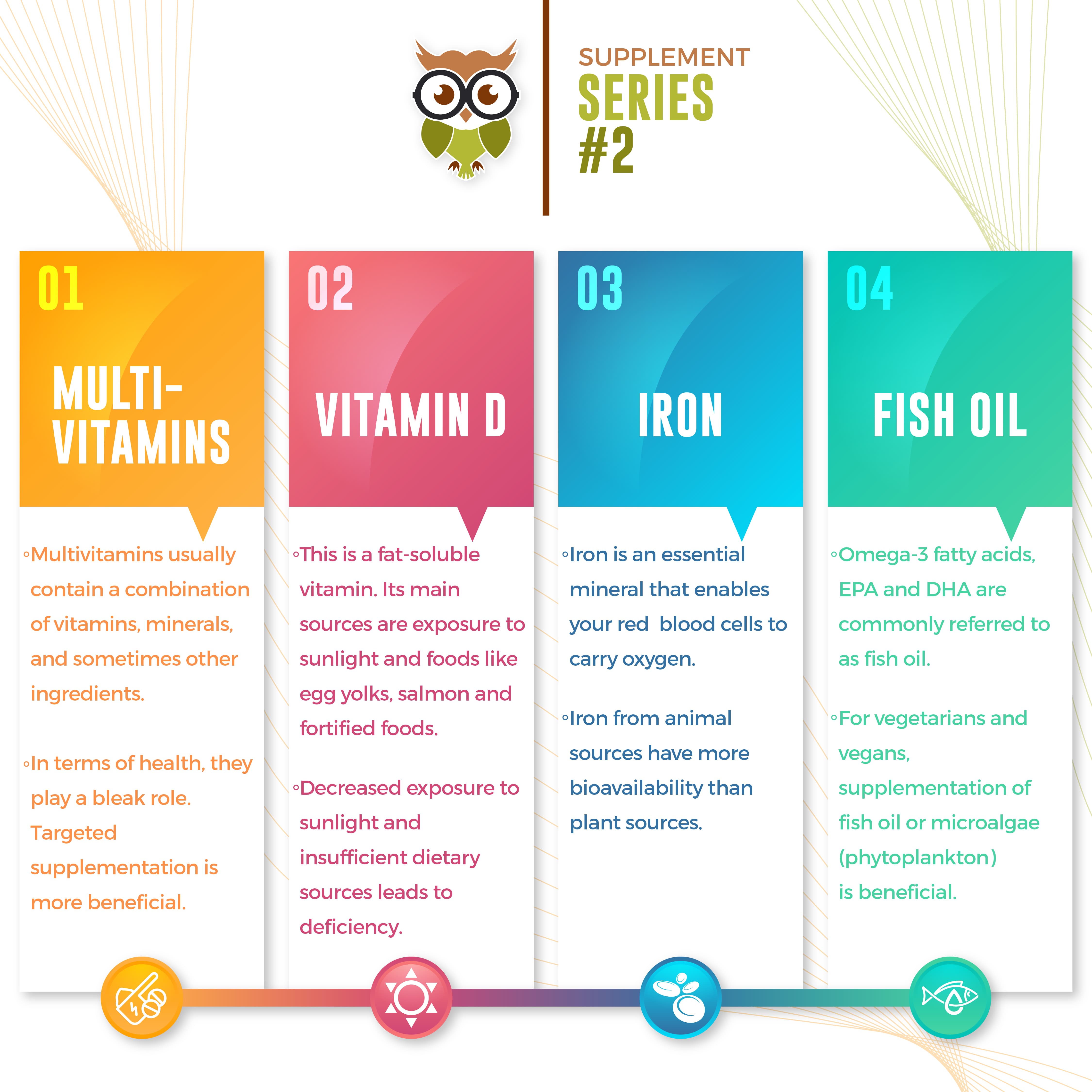Supplement Series #2
We are back with our supplement series for the month! Incase you haven’t read our previous article, click here. This month we will be covering some supplements that are seen very commonly in households. Do you and your family take these supplements? If so, are they really necessary?

1) Multivitamins: Multivitamins are supplements that usually contain a combination of vitamins and minerals and sometimes, other ingredients as well (1). While they’re available in several forms, the most commonly observed mode is through tablets or capsules. These supplements are easily available in local pharmacies and even online platforms. Each essential vitamin and mineral have a preset requirement, known as the Recommended Dietary Allowance (RDA), which varies with age and gender. Most of the constituents in multivitamins are close to these recommended amounts. However, is it mandatory that everyone takes a multivitamin? Not necessarily. Those who are at risk of deficiencies and the dosage from the multivitamin supplement is sufficient to reverse it, benefit from its consumption. Even in these cases, purchasing the individual vitamin/mineral supplement might be better. Why does everyone consume them though? People consume multivitamins with an attempt to improve ‘health’. A good indicator of this is mortality, or the ability to live. A 2013 meta-analysis concluded that multivitamins had no significant effect on mortality risk (2). Further, there is insufficient evidence to conclude the role of multivitamins in preventing cancer and chronic diseases (3). In terms of health, multivitamins play a bleak role. Targeted supplementation seems to be more beneficial. Although, if you do plan on buying a multivitamin because the dosage does negate your deficiency, this link will provide tips on how to buy a good one (4)
2) Vitamin D: Vitamin D is a fat soluble vitamin. The sources of vitamin D are primarily exposure to sunlight and foods such as egg yolks, fish like salmon and fortified foods. This particular vitamin is extremely important for calcium metabolism, which is in turn responsible for maintaining healthy bones and even nerve conduction. The RDA for vitamin D is 400-800 IU/day. However, a particular review reports that vitamin D deficiency in Indians range from 50-94% in healthy individuals (5). So, what causes the deficiency? Decreased exposure to sunlight and insufficient sources of vitamin D from the diet are the primary causes. So do you need to supplement with Vitamin D? If your blood tests indicate you have a deficiency or sub optimal levels, then yes. These supplements must be taken along with a fat source or meals. Our advice would be to go get yourself tested and then take a call!
3) Iron: Iron is a very essential mineral that enables your red blood cells to carry oxygen to your tissues. Iron is found in a wide variety of plant and animal sources such as green leafy vegetables, beans, lentils, nuts, seeds and meat. The iron from animal sources is more bioavailable (better absorbed) than those from plant sources. Vegetarians, worry not! Combining an iron source with vitamin C sources increases the bioavailability of iron. So keep that in mind! Do you need to supplement with iron? This again depends. Only if you are deficient, iron supplementation is necessary. Iron deficiency causes anemia, which seems to be seen primarily in premenopausal women who do not consume enough iron through their diet and also lose iron through menstruation (6). Iron deficiency anemia is just one type of anemia. We will be covering this in depth in our upcoming articles. Iron deficiency manifests through symptoms like fatigue, weakness, pale skin and shortness of breath. If you have been feeling very tired and exhausted, you might know where to look at. Get a blood test done to check your iron levels. To prevent yourself from a deficiency or sub optimal levels, ensure your diet has iron rich food!
(4) Fish oil: Omega 3 fatty acids, eicosapentanoic acid (EPA) and docosahexanoic acid (DHA) are commonly referred to as fish oil. These are essential fatty acids, which means that your body cannot make them and must be obtained from diet. They’re found in fish and phytoplanktons. Our staple diets are rich in omega-6 fatty acids which are found in eggs, meat and oils. To balance the ratio between Omega-6 and Omega-3 in the body, consumption of fatty fish like salmon is encouraged. While you would have heard that seeds like flax and chia contain omega-3, they actually contain alpha-linolenic acid (ALA), which is a precursor to EPA and DHA. However, research suggests that ALA does not provide the same benefits as supplementing with EPA and DHA (7). However, the link between fish oil and cardiovascular disease is debatable. For those who do not consume fish (ie; vegetarians and vegans) supplementation of fish oil or microalgae (phytoplankton) might be beneficial.
This article covered commonly used household supplements. While this list is exhaustive, we will aim to cover more in the coming series and keep you informed.
References:
- National Institutes of Health. Multivitamin/mineral supplements.
- Macpherson, H,Pipingas,A, Pase, MP. Multivitamin-multimineral supplementation and mortality: a meta-analysis of randomized controlled trials. American Journal of Clinical Nutrition.2013;97(2):437-444.
- Huang HY, Caballero B, Chang S, Alberg AJ, Semba RD, Schneyer CR et al. The efficacy and safety of multivitamin and mineral supplement use to prevent cancer and chronic disease in adults: a systematic review for a National Institutes of Health state-of-the-science conference. Annals of Internal Medicine.2006;145(5):372-85.
- Examine. Do you need a multivitamin?
- P Aparna, S Muthathal,Nongkynrih, B,Gupta, SK.Vitamin D deficiency in India. Journal of Family Medicine and Primary Care.2018;7(2):324-330.
- Fernández-Gaxiola, AC, De-Regil, LM.Intermittent iron supplementation for reducing anaemia and its associated impairments in menstruating women. The Cochrane database of systematic reviews. 2011;10: CD009218.
- Wang C, Harris WS, Chung M, Lichtenstein AH, Balk EM, Kupelnick B et al. n-3 Fatty acids from fish or fish-oil supplements, but not alpha-linolenic acid, benefit cardiovascular disease outcomes in primary- and secondary-prevention studies: a systematic review. The American Journal of Clinical Nutrition. 2006;84(1):5-17.
- National Institues of Health. Omega-3 fatty Acids.
- Can I eat flax seeds instead of fish or fish oil for omega-3s?


